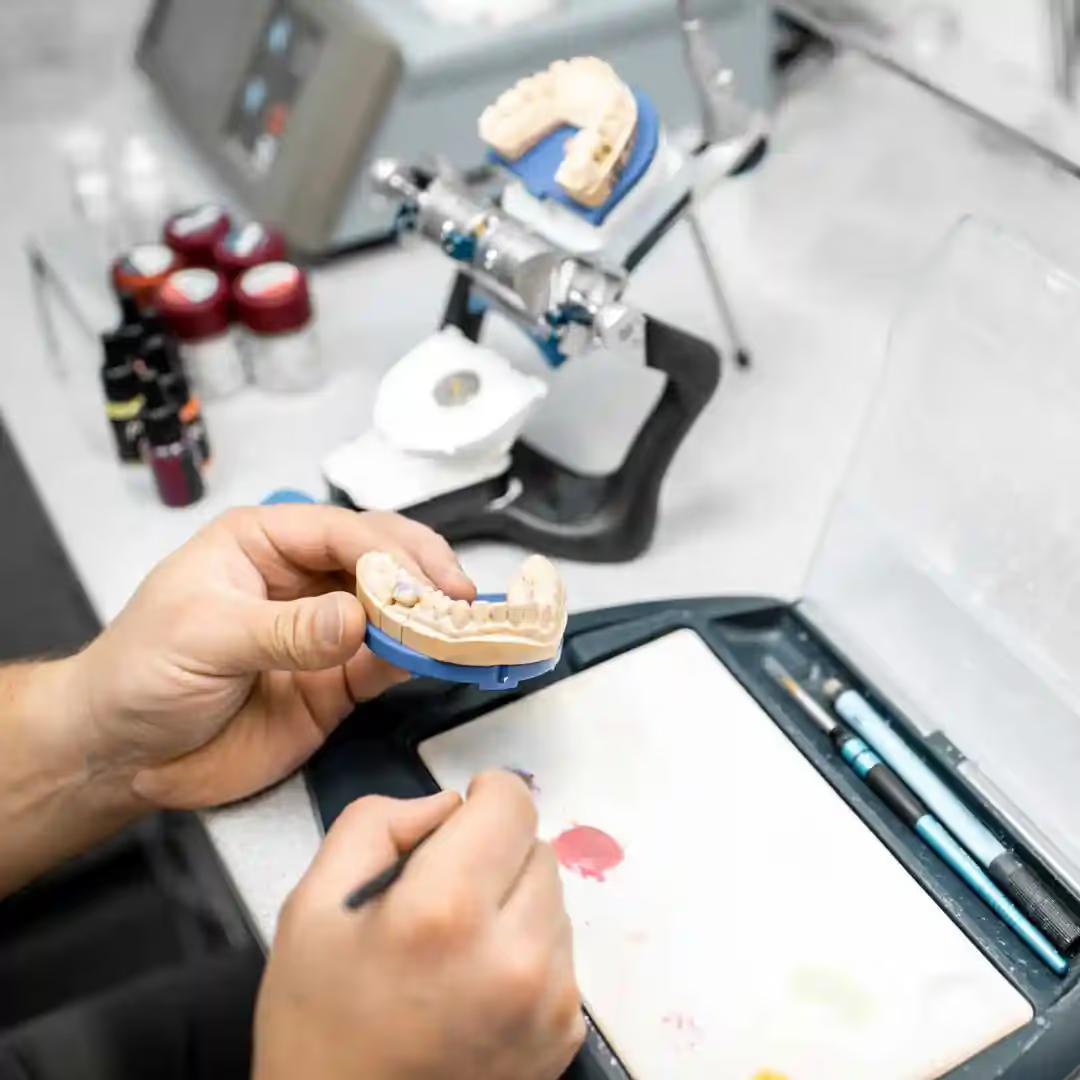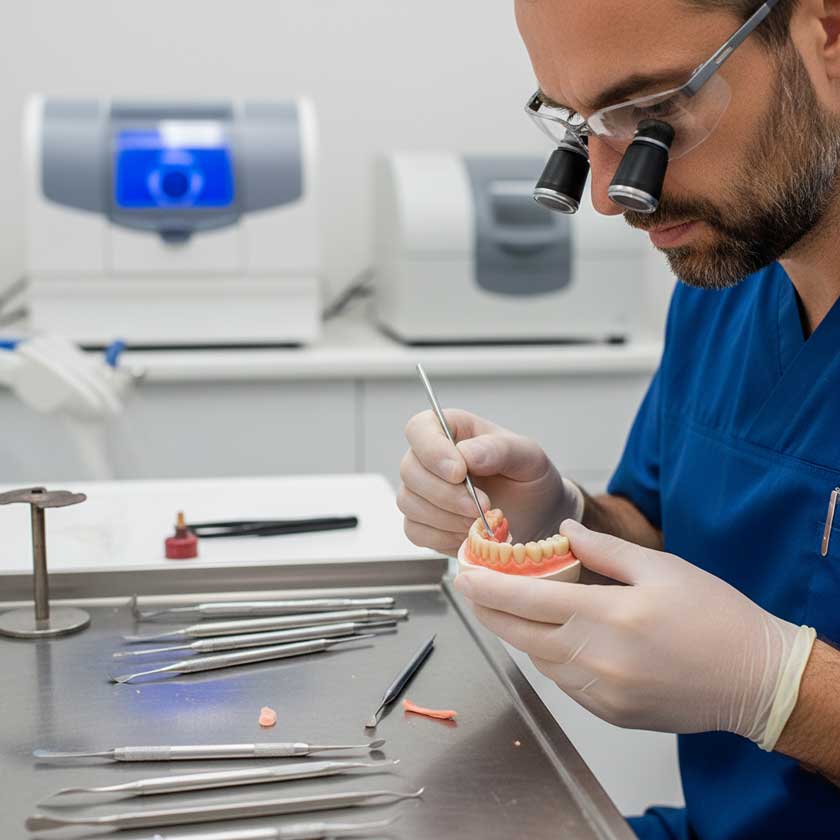Did you know over 120 million Americans are missing at least one tooth? This fact shows how vital denturists are. They help millions by making dental prosthetics.
Denturists make and fit removable dental prosthetics. They use art and science to create dentures that look real and work right. Their skills help people feel confident and live better.
Denturists are key members of the dental team who focus on removable prosthetics. They ensure that dentures fit well, are comfy, and look good. Their special skills are key to fixing teeth.
Key Takeaways
- Denturists are specialists in removable dental prosthetics
- They focus on creating and fitting custom dentures
- Denturists combine artistic skills with dental knowledge
- Their expertise helps improve patients' oral health and confidence
- Denturists offer personalized care for denture wearers
Introduction to denturists and their role in oral health.
Denturists are essential oral health care providers who make removable dental prosthetics fit. They work with patients to ensure dentures are comfy, work well, and look good.
- Designing custom dentures
- Fitting and adjusting prosthetics
- Repairing damaged dentures
- Educating patients on proper denture care
Denturists collaborate with dentists and other dental experts to provide full oral health care. Their skills as dental appliance technicians help make prosthetics that fit and work like real teeth.
Patients gain from denture specialists‘ deep knowledge. These pros know the special issues with dentures and offer tailored solutions. Choosing a denturist means getting value for you and your dental needs.
What is a denturist?
A denturist makes and fits removable dental prosthetics. They help people who have lost some or all their teeth, making smiles brighter and mouths more functional.
Definition and primary responsibilities.
Denturists are experts in making and fixing dentures. They work with patients to design and fit custom dentures. Their main tasks include:
- Taking oral impressions
- Crafting dentures in a dental lab
- Fitting and adjusting prosthetics
- Performing denture repairs and relines
Differences between denturists and dentists.
Dentists and denturists both work with oral health, but denturists focus on removable prosthetics. Dentists do many things, like fillings and implants, but denturists are experts in dentures.
Educational requirements for denturists.
To become a denturist, you need special training as a dental technician. This usually takes three years. It includes:
- Courses in oral anatomy and physiology
- Hands-on training in denture fabrication
- Clinical practice with patients
After school, denturists must pass a certification exam. This ensures they can provide top-notch care in denture services and dental implant restorations.

The history and evolution of denturism.
Denturism has a long history that goes back centuries. Ancient people used different materials for tooth replacements. The early Etruscans made simple partial dentures from animal teeth.
By the 16th century, people in Japan started using wooden dentures, a major step in dentistry.
The 18th century was a big time for denture technology. In 1774, Alexis Duchâteau made the first porcelain dentures. This was a giant leap towards making dentures that looked more natural and lasted longer.
The 19th century brought even more changes:
- 1839: Charles Goodyear's vulcanized rubber changed denture bases
- 1850: The first upper dentures made from vulcanite came out
- 1887: Better ways to make impressions were developed
Modern denturism started in the 20th century. In 1958, Canada made denturism a profession. This allowed trained technicians to work directly with patients, making and fitting dentures and improving dental care for more people.
Now, denturists offer many services. They make custom complete and partial dentures and even implant-supported ones. New materials and techniques keep making dental prosthetics more comfortable and good-looking.
Services offered by denturists.
Denturists offer many services for tooth replacement and restoration. They make dentures that look real and improve your smile.
These services are often provided at a specialized denture clinic.
Complete and partial dentures.
Denturists make full and partial dentures to replace missing teeth. Full dentures replace all teeth in the upper or lower jaw. Partial dentures fill gaps between your natural teeth.
These custom prosthetics help you eat, speak, and smile with confidence.
Denture repairs and adjustments.
Keeping dentures in good shape is essential for your mouth's health. Denturists quickly fix cracked or broken dentures and adjust them for a better fit to prevent discomfort and help avoid oral problems.
Implant-supported dentures.
Implant dentures are a stable way to replace teeth. Denturists use denture implants to make dentures that attach to them, which gives better support and prevents dentures from moving around.
Custom denture solutions.
Every mouth is different, and denturists create custom solutions. They examine your jaw, bite, and face to design dentures that fit perfectly. This ensures that you're comfortable and can use your dentures well.
The process of getting dentures from a denturist.
Starting with dentures means a visit to your denturist. They will review your comprehensive medical and dental history to plan the best treatment. This is key to understanding what your mouth needs and what might affect your dentures.
Your denturist will then check your mouth and any remaining teeth. They will make impressions of your gums and jaw for custom dentures, ensuring your new teeth look and feel right.
Here’s what to expect during your denture journey:
- Initial consultation and examination
- Taking impressions of your mouth
- Designing and crafting your dentures
- Fitting and adjusting your new teeth
- Follow-up appointments for fine-tuning
Your denturist will help you through each step, answering questions and easing worries. They will also ensure your dentures fit well, allowing you to eat, speak, and smile confidently. Remember, getting use to your new teeth takes time.

Benefits of choosing a denturist for your dental prosthetics.
Denturists have special skills in dental prosthetics and know a lot about removable oral appliances, which makes them great for many dental problems.
Specialized expertise in removable prosthetics.
Denturists are experts in making and fitting removable dental devices. They know how the mouth works, so your dentures will fit right and work well.
Cost-effective solutions.
Going to a denturist can save you money. Denturists provide denture services directly, skipping the middleman and making top-notch dental care cheaper for more people.
Personalized care and attention.
Denturists provide personalized care. They listen to what you need, whether fixing dentures or getting new ones, to make your dentures look and feel good.
- One-on-one consultations
- Custom-made dentures
- Regular follow-ups and adjustments
Choosing a denturist means getting special care, saving money, and getting attention just for you. These benefits make denturists a top choice for anyone needing dental prosthetics.
Denturists and oral health: Beyond tooth replacement.
Denturists are key to keeping your mouth healthy, not just by replacing teeth. They work on keeping your whole mouth healthy, including the lower and upper parts.
When making dentures, they think about more than looks. They make sure they fit right and work well. This stops problems like:
- Gum irritation and inflammation
- Bone loss in the jaw
- Difficulty speaking or eating
- Facial structure changes
Custom dentures from denturists keep your mouth in the right position. This prevents your natural teeth from wearing unevenly and lowers the chance of TMJ disorders.
Removable dentures need regular check-ups and adjustments. At these visits, denturists can catch early signs of mouth problems, helping to prevent bigger issues later.
Choosing a denturist means you're getting full care for your mouth. They know a lot about dentures. This means your dentures will look good and help your mouth stay healthy.
Denturists: Restoring smiles and confidence with expert prosthetic care.
Denturists are key in oral health care. They make and fit removable dental prosthetics. They help denture patients by giving them back their smiles and better lives.
They offer many services, like complete dentures and implant-supported ones. These are for people who lose teeth due to gum disease or other reasons. Denturists ensure the prosthetics are comfy, work well, and look real.
Choosing a denturist means getting care from a pro who cares about removable prosthetics. Denturists offer affordable options and listen to what each patient needs. They are great allies for those with dental issues who want to get their oral health back and feel confident about their smiles.
FAQ
What is a denturist?
A denturist is a pro who makes and fixes dentures and partial dentures. They focus on removable dental pieces.
What services do denturists offer?
Denturists provide many services, including full and partial dentures, fixing dentures, and implant-supported dentures. They also offer custom dentures for each patient.
How are denturists different from dentists?
Dentists handle general dental care. Denturists focus on dentures and removable dental devices. They work with dentists for full dental care.
What educational requirements do denturists have?
Denturists finish a special program in denturism or dental technology. This includes learning about anatomy, dental materials, and making dentures. They also get clinical experience.
Can denturists provide services for dental implants?
Yes, denturists can make implant-supported dentures. They work with oral surgeons and dentists to find solutions to these problems.
How do I know if I need to see a denturist?
See a denturist if you're losing teeth, need denture fixes, or want new teeth. They can check your needs and offer denture options.
What is the process of getting dentures from a denturist?
First, you have a consultation. Then, they take dental impressions. Next, they make custom dentures. After that, they check the fit and make any needed changes.








